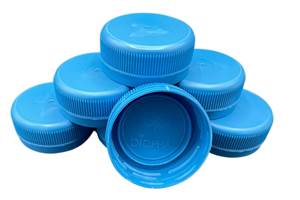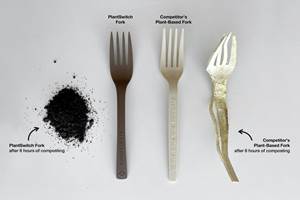'Plug-and-Play' Bioplastic Platform Results in Various Grades of PC
Teysha Technologies' proprietary platform enables development of polymers that combine strength and toughness with hydrolytic breakdown to biologically beneficial byproducts at end of life.
We recently were contacted by U.K.-based Teysha Technologies, which after more than a decade of research has achieved a landmark breakthrough in creating a viable substitute for existing petroleum-based PC resins, and potentially other plastics
Explains project research scientist Ashlee A. Jahnke, “Our technology uses a plug-and-play system that takes monomers and co-monomers—the natural building blocks that make up plastic—to create a polymer that works and functions in a very similar way to the plastic we’re used to. The difference is that our monomer feedstocks are derived from natural sources such as starches and agricultural waste products, rather than hydrocarbon-based petrochemicals sourced from fossil fuels.”
Moreover, the platform the researchers have created to build these biopolymers reportedly allows them to precisely tune the physical, mechanical and chemical properties of the resulting polymer to make it usable in a variety of materials. As such, they are able to adjust the strength, toughness, durability and longevity of the polymers to suit different applications. Says Jahnke, “We can create rigid or flexible materials, or ones that offer different thermal properties. Crucially, we can also control the biodegradation of our polymers so that they breakdown in weeks or years, returning back to their basic building blocks that can be beneficial to plants.”
Here are Jahnke’s responses on some key questions we posed regarding the status of the technology:
β Does your technology result in a PC type polymer only at this juncture? When you say it can produce a wide range of plastics, does it mean different grades of PC and/or PC blends... or other thermoplastics?
“Currently, all the plastics we produce are polycarbonates, but many also contain ester bonds. We can also produce simple polyesters using our technology platform. We can produce a wide range of plastics because our plug-and-play platform allows us to use various natural product monomers as polymer building blocks, and our current focus is on various grades of polycarbonate.”
β Are you licensing the technology? Globally?
“We are not licensing at the moment, but we will be exploring several commercial arrangements, both upstream and downstream, and global licensing will most definitely form part of our strategy. Our chairman, Dr. Clive Rankin, has particular experience in this field as ex-vice president of Degussa Fine Chemicals.”
β Is there any performance data you can share comparing the material to virgin PC and/or other bio-based plastics like PLA?
“We don't have much of this type of direct comparison data at this point, but this is something that we are working on. We do know that our degradation temperatures are comparable to other bioplastics, and a bit lower than typical PC on the market. Other performance characterization work is ongoing.”
β Is anyone using the technology toward a commercial end? Are these polymers for injection molding? Extrusion? Blow molding? Is it for rigid products or flexible products as well? Can you list potential applications?
“The technology is not yet at the commercial stage. However, our thermoset polymers have demonstrated the ability to be molded and cured, by both UV and heat, to form prototype fishing lures. The thermoplastics will likely be best for injection molding, but we have not begun testing this yet.
“Beyond these applications, our technology platform allows us to be very versatile, because the products can be either rigid or flexible depending on the monomers used for polymerization. As such, there is a wide range of potential applications, from building insulation to food packaging and medical implants to drug delivery systems. We have even considered molding for automobiles.”
Related Content
PHA Compound Molded into “World’s First” Biodegradable Bottle Closures
Beyond Plastic and partners have created a certified biodegradable PHA compound that can be injection molded into 38-mm closures in a sub 6-second cycle from a multicavity hot runner tool.
Read MoreICIS Launches: Ask ICIS Generative AI Commodities Assistant
Said to be the first of its kind, this AI assistant will enhance access to ICIS’ intelligence and insights for the energy and chemical markets.
Read MoreNPE2024 Materials: Spotlight on Sustainability with Performance
Across the show, sustainability ruled in new materials technology, from polyolefins and engineering resins to biobased materials.
Read MoreAdvanced Biobased Materials Company PlantSwitch Gets Support for Commercialization
With participation from venture investment firm NexPoint Capital, PlantSwitch closes it $8M bridge financing round.
Read MoreRead Next
Making the Circular Economy a Reality
Driven by brand owner demands and new worldwide legislation, the entire supply chain is working toward the shift to circularity, with some evidence the circular economy has already begun.
Read MorePeople 4.0 – How to Get Buy-In from Your Staff for Industry 4.0 Systems
Implementing a production monitoring system as the foundation of a ‘smart factory’ is about integrating people with new technology as much as it is about integrating machines and computers. Here are tips from a company that has gone through the process.
Read MoreSee Recyclers Close the Loop on Trade Show Production Scrap at NPE2024
A collaboration between show organizer PLASTICS, recycler CPR and size reduction experts WEIMA and Conair recovered and recycled all production scrap at NPE2024.
Read More















